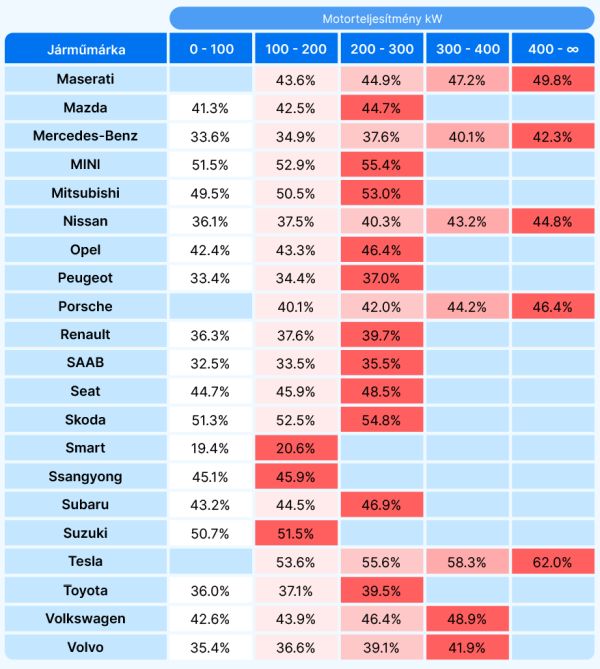The latest survey by carVertical examined the vehicle history reports of 43 car brands in relation to engine performance and the number of accidents. In all cases, it has been confirmed that cars equipped with more powerful engines are involved in accidents more often. Among all the vehicle brands analyzed in the research, BMW stood out: 60.3% of cars under 100 kW suffered damage, compared to the 68.6% accident rate of vehicles in the category over 400 kW.
Beginner drivers are usually advised to drive a car with a cheap and relatively low-powered engine until they have enough experience on the roads – this will give them a better chance of avoiding accidents. At the same time, it is also a fact that the braking system of powerful vehicles is more advanced, which in turn makes driving easier. Automotive data provider carVertical conducted a study based on data from used car history reports retrieved from its platform to find out if there is a relationship between average vehicle engine power and accident rates.
In all cases, it has been confirmed that cars equipped with more powerful engines are involved in accidents more often. 46.4% of the Audi vehicles under 100 kW checked on the carVertical portal had a record of damage, while the rate of damage for models over 400 kW is significantly higher (55.6%). A similar trend can be observed for Volkswagen brand cars, where 42.6% of models with a power of less than 100 kW were damaged, while this ratio was 48.9% for 300-400 kW engines. 45% of Ford vehicles equipped with engines with a power of up to 100 kW were damaged, while 55% of cars with engines over 400 kW were damaged. Among the Renault cars with the lowest power engine, 1 out of 3 suffered minor or major accidents (36.3%). For cars with 200–300 kW engines, the rate of accidents was much higher, 39.7%.
Skoda is one of those brands where the damage frequency differs only slightly between smaller and more powerful cars: 51.3% of the damaged models had an engine power below 100 kW, and 54.8% between 200 and 300 It ran with a kW motor. However, Skoda, like some other vehicle brands, does not produce models equipped with engines larger than 400 kW, which could result in higher injury rates. A similar situation can be observed in the case of Toyota: 36% of the models equipped with a weaker engine were damaged, compared to 39.5% of the 200-300 kW cars. Among all the vehicle brands analyzed in the research, BMW stood out: 60.3% of cars under 100 kW suffered damage, compared to the 68.6% accident rate of vehicles in the category over 400 kW.

“While all vehicles must obey the traffic rules equally, drivers of more powerful cars appear to be more likely to ignore speed limits and take greater risks more often. We didn’t find a single brand where vehicles with lower performance suffered more accidents,” automotive industry expert Matas Buzelis, head of communications at carVertical, reports on the results of the research.
Source: sg.hu


